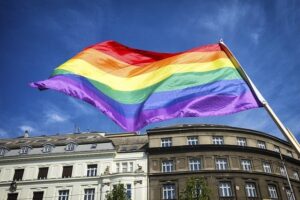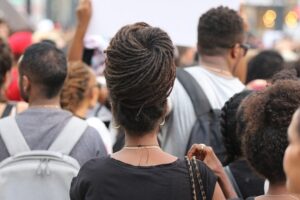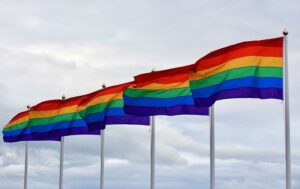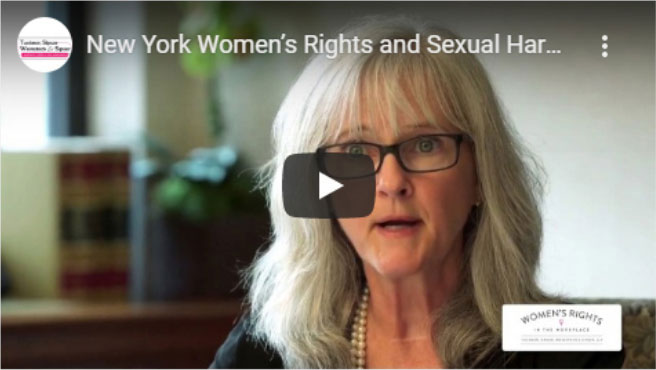In a controversial move, President Donald Trump issued an executive order prohibiting the display of Pride and Black Lives Matter (BLM) flags at U.S. embassies and federal buildings. This action has raised significant concerns about the broader implications for workplace discrimination protections. Could this ban signal a shift in how employers interpret and enforce workplace policies regarding diversity, equity, and inclusion? More importantly, does this decision embolden employment discrimination against LGBTQ+ individuals and racial minorities in professional settings?

If you believe your workplace rights are being threatened or that this policy change could impact diversity and inclusion where you work, Tuckner, Sipser, Weinstock & Sipser is here to help. Our firm is dedicated to protecting employees from discrimination and ensuring that every worker—regardless of race, gender, or sexual orientation—is treated fairly under the law. If you’re facing workplace discrimination or have concerns about your rights, contact us today at 212-766-9100 to schedule a free consultation with an experienced New York employment rights attorney. Together, we can stand against injustice and fight for a more equitable workplace.
Understanding the Impact of the Ban
 At its core, the “one flag policy” is a ban that prevents the display of flags that symbolize movements advocating for marginalized communities. While proponents argue that federal buildings should remain politically neutral, opponents see this as a direct attack on the visibility and rights of LGBTQ+ individuals and Black Americans.
At its core, the “one flag policy” is a ban that prevents the display of flags that symbolize movements advocating for marginalized communities. While proponents argue that federal buildings should remain politically neutral, opponents see this as a direct attack on the visibility and rights of LGBTQ+ individuals and Black Americans.
In the workplace, visibility matters. Flags and other symbols often serve as affirmations of inclusion, signaling that employees from all backgrounds are welcome, safe, and supported. By targeting these specific movements, the ban raises the question of whether private employers might feel justified in suppressing expressions of identity and advocacy in their own workplaces, potentially leading to employment discrimination.
Potential Effects on Workplace Discrimination Cases by the Equal Employment Opportunity Commission
Employers are bound by federal and state anti-discrimination laws and regulations, which prohibit discrimination based on race, gender, sexual orientation, and other protected categories. However, cultural shifts—especially those influenced by government actions—can impact how these laws are interpreted and how workplace policies are implemented.
 Some potential effects include:
Some potential effects include:
- Increased Justification for Restrictive Policies: Some employers may use the ban as a rationale to prohibit similar expressions of identity or advocacy in the workplace, potentially creating a hostile work environment.
- Chilling Effect on Employees: Employees who fear retaliation may feel less inclined to express their authentic identities and beliefs through symbolism, including Pride or BLM flags. Fearful employees are also less likely to report workplace discrimination or harassment. This suppression of expression and advocacy can create a toxic work environment where discrimination festers unchecked. However, as experienced NYC employment discrimination attorneys, we want you to know that retaliation is illegal—your employer cannot punish you for asserting your rights or speaking out against discrimination. If you face retaliation for expressing your identity or supporting workplace equality, we can fight back. Contact Tuckner, Sipser, Weinstock & Sipser today to discuss your legal options and ensure your workplace remains a space of fairness, inclusion, and respect.
- Legal Gray Areas: While Title VII of the Civil Rights Act protects employees from discrimination based on race and sex (which has been interpreted to include sexual orientation and gender identity), restrictive workplace policies on political expression and advocacy can sometimes blur the line between discrimination and corporate policy enforcement.
- Stigmatization and Workplace Harassment: Bans on symbols such as pride and BLM flags contribute to the stigmatization of Black and LGBTQ people as well as other racial minorities and proponents of racial justice. Further stigmatizing these groups and their symbols can lead to workplace harassment. Harassment creates a hostile work environment detrimental to employee performance and well-being.
Historical Context: Workplace Rights and Symbolism Under the Civil Rights Act of 1964

The role of symbols in advocating for workplace rights is not new. During the Civil Rights Movement, businesses and government offices often attempted to suppress expressions of racial equality. More recently, corporate policies on political expression have been scrutinized, with some businesses outright banning political discussions while others actively supporting social justice initiatives.
Federal laws, including the Civil Rights Act of 1964, protect employees from retaliation for speaking out against discrimination. However, the enforcement of these laws varies. If a workplace imposes a blanket ban on all advocacy symbols, it might not be deemed discriminatory. However, selectively banning symbols associated with specific movements could lead to discrimination claims filed with the Equal Employment Opportunity Commission.
What Employees Should Know About Their Rights
 Employees who experience workplace discrimination based on their race, sexual orientation, or gender identity should be aware of their legal protections, including:
Employees who experience workplace discrimination based on their race, sexual orientation, or gender identity should be aware of their legal protections, including:
- Title VII of the Civil Rights Act: Protects against discrimination based on race, color, religion, sex, and national origin.
- The Americans with Disabilities Act (ADA): Protects employees with disabilities, including those with mental health conditions caused or exacerbated by stigmatization, from discrimination and requires reasonable accommodations for these employees.
- State and Local Laws: Many states and cities have enacted additional protections against workplace discrimination.
- Company Policies: Some employers have internal policies that go beyond federal protections, offering additional safeguards.
- Employment Discrimination Attorneys: Hiring an experienced employment discrimination attorney to guide victims through the complex legal processes involved in employment discrimination cases can lead to better outcomes. As employment discrimination lawyers with decades of experience, we fight to protect out clients’ rights and seek to secure full compensation for any discrimination suffered.
- Sexual Harassment: Legal protections are available to address sexual harassment in the workplace. Victims are urged to seek legal advice to safeguard their rights and ensure proper handling of their cases.
- Free Consultation: We offer a free consultation with an experienced NYC employment discrimination lawyer to help you understand the merits of your case and explore your legal options without any financial obligation.
Relevant New York State Laws on Employment Discrimination
New York State has some of the strongest workplace discrimination protections in the country. The New York State Human Rights Law (NYSHRL) prohibits discrimination based on race, gender, sexual orientation, gender identity, and other protected characteristics. The law applies to both public and private employers, ensuring employees have robust protections beyond federal statutes.
Additionally, the Gender Expression Non-Discrimination Act (GENDA) explicitly prohibits discrimination based on gender identity or expression, providing further safeguards for LGBTQ+ employees. New York law also protects employees from retaliation if they report discrimination or participate in investigations related to workplace harassment.
If an employer in New York implements policies that disproportionately affect LGBTQ+ employees, racial minorities, or employees advocating for racial justice, it may be grounds for legal action under state law. Employees who believe their rights have been violated should call our office immediately to schedule a free, initial consultation with an experienced discrimination lawyer to understand their legal options and ensure filing deadlines are met.
Examples of Workplace Discrimination Against Racial Minorities and LGBTQ+ Individuals
Discrimination in the workplace can take many forms. Below are some common examples:
- Discriminatory Hiring Practices: Employers excluding job applicants based on their race, sexual orientation, or gender expression.
- Unequal Treatment: Employees from racial minorities or the LGBTQ+ community being passed over for promotions or assigned less favorable tasks without valid justification.
- Harassment: Derogatory comments, slurs, or inappropriate jokes directed at employees based on their race or sexual orientation.
- Dress Code or Grooming Policies: Employers enforcing dress codes that disproportionately affect certain racial or LGBTQ+ identities, such as restrictions on natural hairstyles or gender-nonconforming attire.
- Hostile Work Environment: Creating an atmosphere where employees feel unwelcome or unsafe due to systemic bias or failure to address discrimination complaints.
- Retaliation for Reporting Discrimination: Employees being demoted, reassigned, or harassed after filing complaints about workplace discrimination.
- Wrongful termination: Employees being terminated because of race, sexual orientation, gender or gender expression, or for reporting race or gender discrimination.
- Exclusion from Networking or Leadership Opportunities: Employers failing to provide equal access to mentorship, sponsorship, or professional development opportunities.
- Pay Disparities: Racial minorities and LGBTQ+ employees receiving lower wages than their colleagues despite performing the same work at the same level.
Employees who experience these types of discrimination should document incidents and seek legal guidance to understand their rights and options for recourse.
Intersectionality: How Disability Discrimination Overlaps with Race and Gender Discrimination
Racial minorities and LGBTQ+ individuals are more likely to experience disabilities than their white and non-LGBTQ+ counterparts. Several studies have found that racial minorities and LGBTQ+ individuals have higher rates of chronic health conditions, mental health disorders, and disabilities. Factors contributing to this disparity include:
- Healthcare Disparities – Racial minorities and LGBTQ+ individuals often face barriers to healthcare access, including discrimination, medical misinformation, lack of competent providers, and financial barriers, which can lead to untreated or worsened health conditions.
- Minority Stress – The stress of experiencing stigma, discrimination, and social exclusion can contribute to both mental and physical health issues, leading to higher rates of disabilities.
- Higher Rates of Mental Health Conditions – LGBTQ+ individuals, particularly transgender people, have higher rates of anxiety, depression, and PTSD, which are often classified as disabilities under laws like the Americans with Disabilities Act (ADA).
- Increased Risk of Chronic Conditions – Studies have shown that LGBTQ+ people are more likely to experience conditions like heart disease, diabetes, and HIV/AIDS, which can lead to long-term disability.
- Workplace Discrimination and Health Outcomes – Discrimination in the workplace can lead to job insecurity, lack of access to employer-provided health insurance, and mental health deterioration, all of which can contribute to disability rates.
Given these factors, an intersectional understanding of workplace protections for racial minorities, LGBTQ+ individuals, and disabled individuals is critical in ensuring equal treatment and accommodations under laws like the ADA and Title VII of the Civil Rights Act.
Legal Recourse for Workplace Discrimination: Employment Discrimination Attorneys
 If an employee believes they are experiencing discrimination, they should:
If an employee believes they are experiencing discrimination, they should:
- Document Incidents: Keep records of discriminatory behavior, such as anti-LGBTQ language, racial slurs, gender discrimination, sexual harassment, and disability discrimination, such as failure to provide reasonable accommodations. Evidence may take the form of emails, text messages, voice recordings, memos, and witness statements.
- Report the Issue: Follow internal procedures by reporting to HR or a designated compliance officer.
- Seek Legal Advice: Schedule a free consultation with our experienced employment discrimination lawyers to understand the legal options available.
Frequently Asked Questions (FAQs)
 Does this ban affect private workplaces?
Does this ban affect private workplaces?
No, the ban applies to government buildings and embassies. However, it may influence workplace culture and employer policies regarding symbolic expressions.
Can my employer ban Pride or BLM symbols in the workplace?
Employers can enforce dress codes and workplace policies, but selectively banning certain symbols could be considered discrimination if it disproportionately impacts protected groups.
What should I do if I am experiencing discrimination at work?
Document the incidents, report the behavior to HR, and seek legal counsel to explore your options. As dedicated NYC employment discrimination lawyers, we can help you seek justice and financial compensation.
Are LGBTQ+ employees still protected under federal law?
Yes, the Supreme Court ruled in Bostock v. Clayton County that Title VII protects employees from discrimination based on sexual orientation and gender identity.
Can my employer retaliate against me for supporting LGBTQ+ or racial justice causes?
No, retaliation for opposing discrimination or advocating for equal rights is illegal under federal law.
How can a lawyer help if I face discrimination?
A discrimination lawyer can assess your case, help gather evidence, and represent you in legal proceedings if necessary. Consulting York City employment lawyers can provide you with a better understanding of your rights and protections under the law.
What damages can I recover in a workplace discrimination case?
Potential remedies include back pay, reinstatement, compensatory damages, and legal fees. The New York State Division of Human Rights can also assist in addressing complaints and enforcing protections against unfair treatment in the workplace.
Take Action Against Workplace Discrimination – Schedule A Free Consultation With an Experienced New York City Employment Discrimination Attorney.
Discrimination in the workplace should never be tolerated. If you believe you are being treated unfairly due to your race, gender, sexual orientation, or advocacy for social justice, an employment discrimination lawyer can provide the legal support you need. At Tuckner, Sipser, Weinstock & Sipser, we protect employees’ rights and ensure workplaces remain free from discrimination and hold employers accountable for racial discriminatory practices.
Contact our law firm today to schedule a free consultation to discuss your case. Your voice matters, and our legal team is here to provide top quality legal assistance to help you fight for your rights in New York City.

 Does this ban affect private workplaces?
Does this ban affect private workplaces?